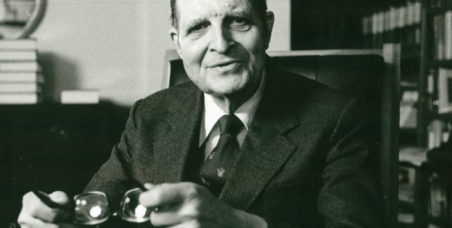Few novelists can illustrate the angst of middle-class American life with more vivid imagery than John Updike. Updike is, of course, no friend to orthodox Christianity, although he draws at times on a distinctively Barthian stream of neo-orthodox theology. Even so, Updike’s novels—especially his series of four books on the life of Harry “Rabbit” Angstrom—lay out the problem of guilt, sin, and judgment better than many gospel tracts.
A New York Times review of a new collection of Updike’s early stories picks up on something of this. Of Updike, the Times writes: “While his male characters pursue sex with dogged zeal — be it with a neighbor’s wife, a colleague or a prostitute — they also suffer from a spiritual hunger, a craving, if not for God then for some reassurance that there is something between them and the abyss they can glimpse just beyond the familiar world with ‘its signals and buildings and cars and bricks.’”
This assessment is on to something. After all, Updike’s “Rabbit” is aptly named. He moves through a life of casual sexual encounters—all of them ending in despair and emptiness. He seeks security in his material prosperity, his athletic glory days, and in his sullen family. But, behind it all, he is terrified of death. Like an animal, he seeks to obey his passions. But he is secretly afraid that his death will be quite different than that of an animal. The conscience within seems to speak of something else—a final accounting for one’s life.
And there is nothing scarier than that.
One cannot help but wonder if Mr. Updike’s pen is his therapy—helping him cope with the terror he ascribes to “Rabbit” and a dozen other fictional characters. Evangelical Christians need to listen to this angst, because it is not a phenomenon limited to elite novelists in New York. It is what all of unregenerate humanity holds in common—what Scripture calls “a fearful expectation of judgment” (Heb 10:27 ESV). Middle class Americana cannot silence this gnawing within. Neither can romance novels or Internet pornography or making partner in a prestigious law firm.
The only thing that can quiet the conscience is the voice of one who has gone as a pioneer behind the veil of death (Heb 6:19-20)—a voice that pronounces the verdict “no condemnation” (Rom 8:1). Perhaps John Updike will one day hear that voice—the voice of a Nazarene whose footsteps in his novels can be heard in the distance.
Until then, the rabbit runs.
Source: Michiko Kakutani, “The Early Years of Updike’s
Run,” New York Times, B29 and 39.







